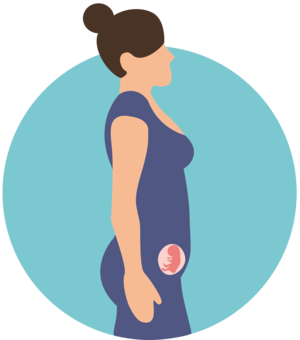Pregnancy at week 15
4-minute read
Your baby
Your baby is gaining weight quickly now, and their body is growing faster than their head. They weigh about 80g and measure about 12cm from head to bottom – about the size of an orange.
The bones in the baby’s ears are developing, which means they are starting to hear for the first time. They will be able to listen to the sound of your heartbeat, digestive system and voice. Their eyes are still fused shut, but they can respond to light.
They may be able to suck their thumb, grip with their fingers, squint and grimace. Fine hair, called lanugo, is starting to grow all over their body.
Your baby at 15 weeks
| Length: | 12cm |
| Weight: | 80g |

Your body
More blood is now flowing around your body, which might be giving you a pregnancy ‘glow’. It can also cause some side effects, including changes to your blood pressure, bleeding gums or nose, and headaches.
The nausea of the first trimester should have cleared up by now, but talk to your doctor if you’re still feeling sick or vomiting.
You will be gaining weight and your body may be changing. The skin around your nipples may be getting darker and you may notice your hair and nails are growing more quickly. You might feel a bit achy and have tingling in your hands or feet – but this is normal.
Things to remember
From 15 weeks, you might have a blood test and detailed ultrasound, known as maternal serum screening. This is usually done if you didn’t have the combined first trimester screening. Maternal serum screening will indicate whether your baby is at risk of certain physical or intellectual conditions such as Down syndrome– but it’s not foolproof. While screening might suggest about 5 in every 100 babies could be at increased risk, most of these won’t experience problems.
If you need to have an amniocentesis, this can be done from 15 weeks. An amniocentesis is not a routine test in pregnancy; it’s used to diagnose any problems or serious health conditions affecting your baby.
You might also need an amniocentesis if you’re older than 35, if there is a history of genetic disorders in your family, or if the screening tests you had earlier in your pregnancy showed there might be a problem. An amniocentesis will give you a clear diagnosis.
Read next

Your pregnancy at 16 weeks
Learn about your pregnancy journey and what is happening to you and your baby.

Speak to a maternal child health nurse
Call Pregnancy, Birth and Baby to speak to a maternal child health nurse on 1800 882 436 or video call. Available 7am to midnight (AET), 7 days a week.
Learn more here about the development and quality assurance of healthdirect content.
Last reviewed: April 2022